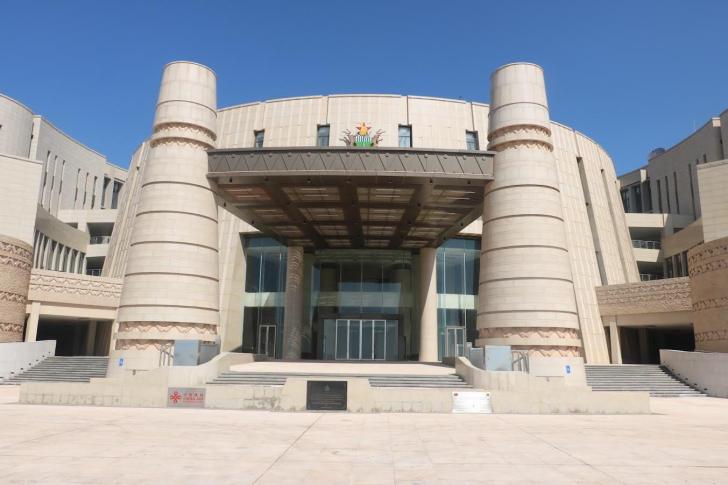News / National
Zimbabwe Parliament resumes sitting
11 Feb 2025 at 06:39hrs |
0 Views

Parliament of Zimbabwe officially resumes sitting today after nearly two months of recess, with a significant legislative workload awaiting legislators. The two houses had adjourned in December last year following the passing of the 2025 national budget to allow for the festive season break.
While Parliament formally reopens today, portfolio committees have already begun their work, holding closed-door in-house meetings to address key legislative matters. Among the critical bills under consideration is the Persons with Disabilities Bill, which seeks to replace the outdated Disabled Persons Act. The bill aims to align Zimbabwe's laws with the United Nations Convention on the Rights of Persons with Disabilities, improving the rights and freedoms of people living with disabilities.
Another important piece of legislation is the Parks and Wildlife Amendment Bill. This bill proposes empowering communities living near wildlife parks to participate in wildlife management and benefit economically from related activities. It also seeks to establish mechanisms for compensating victims of human-wildlife conflicts.
The Private Voluntary Organisations Amendment Bill has returned to the Senate for further consideration of specific clauses that were amended in the National Assembly but omitted in the version sent to the upper house. The amendments focus on improving accountability and transparency in the management of charitable organisations.
The Mines and Minerals Amendment Bill, which has faced delays due to constitutional concerns, seeks to ensure that communities benefit from mineral resources extracted from their areas. It also addresses the rights of farmers whose land hosts mineral deposits. President Emmerson Mnangagwa previously withheld assent to a version of the bill passed in 2018, citing constitutional violations.
The Medical Services Amendment Bill aims to align healthcare legislation with the Constitution, particularly the Declaration of Rights. This bill underscores the right to healthcare for all citizens and permanent residents and addresses the specific needs of vulnerable groups, including children, the elderly, people with disabilities, and war veterans.
The Insurance and Pensions Commission Amendment Bill seeks to broaden the commission's mandate to improve transparency and accountability in the management of insurance and pension funds. Meanwhile, the Broadcasting Services Amendment Bill proposes increasing foreign ownership of broadcasting licences to up to 40 percent, with the goal of attracting growth and investment in the sector.
Another key piece of legislation is the State Services (Pensions) Amendment Bill, which seeks to reform the current pension system. The proposed changes will establish a pension fund to pay out state pensions from investment income, replacing the existing "pay-as-you-go" scheme that relies on monthly contributions from active civil servants.
Several of these bills have been in Parliament for extended periods as stakeholders and lawmakers work to ensure they align with constitutional provisions and national priorities. President Mnangagwa's previous intervention in withholding his assent to flawed legislation underscores the government's insistence on precision and compliance in the legislative process.
The resumption of parliamentary sessions is expected to accelerate the legislative process, as lawmakers tackle a wide range of issues that will impact various sectors of Zimbabwean society. From disability rights and natural resource management to healthcare reform and pension system overhauls, the outcomes of these legislative deliberations will shape the country's future.
While Parliament formally reopens today, portfolio committees have already begun their work, holding closed-door in-house meetings to address key legislative matters. Among the critical bills under consideration is the Persons with Disabilities Bill, which seeks to replace the outdated Disabled Persons Act. The bill aims to align Zimbabwe's laws with the United Nations Convention on the Rights of Persons with Disabilities, improving the rights and freedoms of people living with disabilities.
Another important piece of legislation is the Parks and Wildlife Amendment Bill. This bill proposes empowering communities living near wildlife parks to participate in wildlife management and benefit economically from related activities. It also seeks to establish mechanisms for compensating victims of human-wildlife conflicts.
The Private Voluntary Organisations Amendment Bill has returned to the Senate for further consideration of specific clauses that were amended in the National Assembly but omitted in the version sent to the upper house. The amendments focus on improving accountability and transparency in the management of charitable organisations.
The Mines and Minerals Amendment Bill, which has faced delays due to constitutional concerns, seeks to ensure that communities benefit from mineral resources extracted from their areas. It also addresses the rights of farmers whose land hosts mineral deposits. President Emmerson Mnangagwa previously withheld assent to a version of the bill passed in 2018, citing constitutional violations.
The Insurance and Pensions Commission Amendment Bill seeks to broaden the commission's mandate to improve transparency and accountability in the management of insurance and pension funds. Meanwhile, the Broadcasting Services Amendment Bill proposes increasing foreign ownership of broadcasting licences to up to 40 percent, with the goal of attracting growth and investment in the sector.
Another key piece of legislation is the State Services (Pensions) Amendment Bill, which seeks to reform the current pension system. The proposed changes will establish a pension fund to pay out state pensions from investment income, replacing the existing "pay-as-you-go" scheme that relies on monthly contributions from active civil servants.
Several of these bills have been in Parliament for extended periods as stakeholders and lawmakers work to ensure they align with constitutional provisions and national priorities. President Mnangagwa's previous intervention in withholding his assent to flawed legislation underscores the government's insistence on precision and compliance in the legislative process.
The resumption of parliamentary sessions is expected to accelerate the legislative process, as lawmakers tackle a wide range of issues that will impact various sectors of Zimbabwean society. From disability rights and natural resource management to healthcare reform and pension system overhauls, the outcomes of these legislative deliberations will shape the country's future.
Source - The Herald
Join the discussion
Loading comments…


































